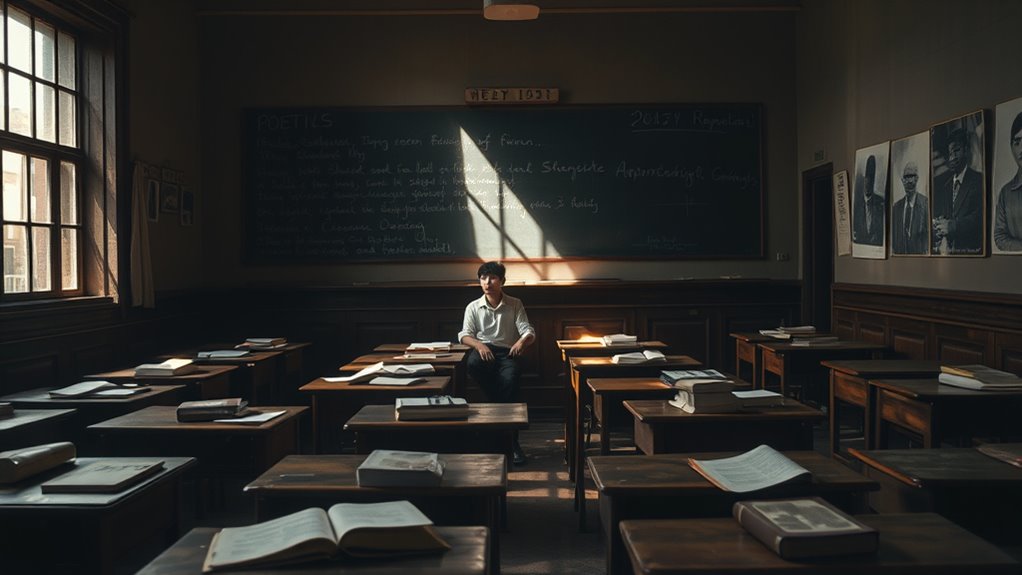If you loved *Good Will Hunting*, you’ll enjoy movies that explore personal growth and emotional depth. *Dead Poets Society* celebrates individuality and inspiration, while *Finding Forrester* highlights the power of an unlikely friendship. *A Beautiful Mind* and *The Man Who Knew Infinity* tackle genius and mental health struggles. For family dynamics, check out *Rain Man* and *Gifted*. Don’t miss *October Sky*, *Searching for Bobby Fischer*, and *The Intouchables* for more heartwarming journeys.
Key Takeaways
- *Dead Poets Society* explores themes of individuality and inspiration, focusing on the impact of an unconventional teacher on his students’ lives.
- *Finding Forrester* highlights an unlikely friendship that fosters personal growth and emotional intelligence between a young writer and a reclusive author.
- *A Beautiful Mind* delves into the complexities of genius and mental health, portraying the struggles of John Nash with schizophrenia and his eventual triumph.
- *Rain Man* examines family dynamics and self-discovery through the evolving relationship between two brothers, focusing on themes of love and personal growth.
- *Gifted* tackles the challenges of nurturing a child prodigy amidst a custody battle, emphasizing the balance between genius and normalcy in family life.
Dead Poets Society

“Dead Poets Society” serves as a poignant exploration of youth, individuality, and the power of inspiration. Set in 1959 at Welton Academy, you follow Todd Anderson and Neil Perry as they navigate the pressures of an all-male preparatory school.
Under the guidance of their unconventional English teacher, John Keating, they form the Dead Poets Society, embracing poetry and self-expression. The film tackles themes of realism versus romanticism and the importance of thinking for yourself. The film’s success is reflected in its global box office of $235,860,579, showcasing its widespread appeal and influence.
Neil’s tragic death serves as a powerful climax, prompting you to reflect on the consequences of conformity. With Robin Williams’ unforgettable performance, this film encourages you to seize the day and live life authentically, leaving a lasting impact on its audience.
Finding Forrester

“Finding Forrester” masterfully weaves a tale of unlikely friendship and personal discovery. Set in New York City, it follows Jamal Wallace, a gifted teenager, and William Forrester, a reclusive author. Their bond begins when Jamal stumbles upon Forrester’s apartment, leading to a secret mentorship.
As Jamal navigates the challenges of a prestigious school, he faces accusations of plagiarism, jeopardizing his scholarship. The movie beautifully explores themes of trust, betrayal, and personal growth, as both characters evolve through their connection. Forrester’s support for Jamal helps him find his voice, while Jamal encourages Forrester to break free from isolation. This poignant story highlights the transformative power of friendship and the importance of recognizing one’s talent. The dynamic between Jamal and Forrester exemplifies the concept of emotional intelligence as they learn from each other’s experiences, enhancing their personal journeys. Additionally, the film emphasizes the value of puppy socialization, suggesting that just as dogs benefit from interacting with diverse environments, Jamal and Forrester thrive through their unique relationship. The film’s depiction of silly tantrums during moments of stress adds a layer of humor, reminding viewers that personal growth often comes with its fair share of challenges. Their journey together serves as a reminder of the importance of seeking support during difficult times, which can lead to greater resilience and understanding.
The Man Who Knew Infinity

While it delves into the life of a brilliant mathematician, *The Man Who Knew Infinity* captivates viewers with its exploration of friendship and cultural clashes.
Based on the life of Srinivasa Ramanujan, the film follows his journey from India to Cambridge, where he faces racism and academic challenges. Additionally, Ramanujan’s creative insights reflect the importance of music therapy integration, as they foster his unique perspective in mathematics. The film also highlights that open communication can be vital in overcoming personal struggles and bridging cultural divides. Furthermore, Ramanujan’s experiences exemplify how emotional regulation can significantly influence interpersonal relationships and academic success. Understanding the concept of diversification in problem-solving can also provide valuable insights into his innovative approach to mathematics.
Dev Patel portrays Ramanujan, showcasing his mathematical genius and deep faith, while Jeremy Irons plays G.H. Hardy, his pragmatic mentor. Their evolving friendship highlights the contrast between Ramanujan’s intuitive methods and Hardy’s formal approach.
Set against the backdrop of World War I, the film emphasizes Ramanujan’s significant contributions to number theory, making it not just a story of struggle, but also a celebration of intellectual brilliance and cultural resilience. Additionally, the film portrays their developing friendship as they navigate the challenges of being outsiders in their respective environments.
Rain Man

*Rain Man* is a poignant exploration of family and self-discovery that follows Charlie Babbitt, played by Tom Cruise, as he navigates his complicated relationship with his autistic savant brother, Raymond, portrayed by Dustin Hoffman.
Directed by Barry Levinson, this 1988 comedy-drama captures Charlie’s transformation from a selfish man seeking financial gain to someone who values familial bonds. Their road trip and casino adventures highlight both conflict and resolution, underscoring themes of inheritance and personal growth. Notably, the film was the highest-grossing film of 1988, achieving remarkable financial success. Its enduring impact can be likened to how celebrity relationships evolve and resonate over time. In the context of family dynamics, the importance of advance directives can play a crucial role in ensuring that loved ones are cared for according to one’s wishes. Additionally, as seen in many family relationships, understanding alimony types can be essential in navigating financial aspects post-divorce. The film also emphasizes the need for digital literacy programs that can help bridge the gap between generations and improve communication among families.
The film achieved remarkable success, grossing over $354 million and winning four Academy Awards, including Best Picture.
While it faced criticism for its portrayal of autism, *Rain Man* remains influential, shaping perceptions and offering lasting cultural impact.
A Beautiful Mind

Exploring the complexities of genius and mental illness, *A Beautiful Mind* tells the remarkable story of John Forbes Nash Jr., a brilliant mathematician whose groundbreaking work in game theory earned him worldwide recognition. The film delves into Nash’s struggle with paranoid schizophrenia, illustrating how this condition impacts his personal relationships and career. Set against the backdrop of the Cold War, it highlights his work on code-breaking for the Pentagon. Despite experiencing mental health issues, Nash ultimately finds a way to manage his symptoms and achieve success. His journey underscores the importance of regular check-ups to monitor mental health, as it plays a crucial role in achieving stability. Additionally, the film reflects the need for comprehensive support systems to aid individuals facing similar challenges. Moreover, the film serves as a reminder of the significance of mammography guidelines for early detection and intervention in health-related issues. In addition, understanding the effects of gaslighting tactics can further enhance one’s resilience in the face of mental health challenges. With a powerful redemption arc, Nash eventually wins the Nobel Prize in 1994. Directed by Ron Howard and featuring standout performances by Russell Crowe and Jennifer Connelly, the film won four Academy Awards, gaining critical acclaim for its portrayal of mental health and resilience in the face of adversity.
Little Man Tate

*Little Man Tate*, released in 1991, offers a touching glimpse into the life of a child prodigy, Fred Tate, who grapples with the challenges of his extraordinary intellect.
Directed by Jodie Foster, the film stars Adam Hann-Byrd as Fred, alongside Foster herself and Dianne Wiest.
You’ll see Fred’s struggle with isolation and his mother Dede’s efforts to nurture both his intellectual and emotional needs. This challenge is often seen in gifted children who may face chronic feelings of emptiness due to their unique experiences. Additionally, the emotional struggles faced by gifted children can sometimes mirror those seen in individuals with borderline personality disorder. The film also emphasizes the importance of early intervention to address emotional and cognitive needs, similar to strategies used in dementia and Parkinson’s care. Moreover, understanding the high omega-3 content in a balanced diet can support mental health, which is crucial for gifted individuals.
As Fred attends a school for gifted children, he discovers acceptance among peers, highlighting the importance of understanding and empathy.
This film sheds light on the limitations of the education system for exceptional students and remains relevant in discussions about the experiences of gifted children in society. It’s a heartfelt exploration of self-discovery and belonging, and it was Jodie Foster’s directorial debut, showcasing her personal connection to the narrative.
October Sky

Set against the backdrop of Coalwood, West Virginia, *October Sky* tells the inspiring story of Homer Hickam, a teenager determined to break free from the limitations of his coal mining town.
Inspired by the 1957 launch of Sputnik 1, Homer dreams of building rockets and working for NASA, despite his father’s wishes for him to follow in the family’s mining tradition. The film effectively showcases the power of education and perseverance, emphasizing how these qualities can lead to remarkable achievements. In addition to this, the story highlights the importance of self-care and mindfulness in maintaining focus and resilience during challenging times. Furthermore, the journey of decluttering one’s mind and surroundings can enhance mental clarity, which is crucial for achieving personal goals. Moreover, the film illustrates the significance of customer acquisition and retention techniques in fostering a supportive community around one’s ambitions.
With the support of friends like Quentin and Roy Lee Cooke, along with encouragement from Miss Riley, he navigates the challenges of community expectations and parental pressure. The film achieved moderate box office success and highlights the importance of education and perseverance, portraying how dreams can flourish even in the face of adversity, ultimately inspiring many young viewers to chase their ambitions in science and engineering.
Searching for Bobby Fischer

While many films portray the journey of young prodigies, *Searching for Bobby Fischer* stands out by capturing the complex dynamics of talent, ambition, and the pressures that come with them.
The film follows chess prodigy Josh Waitzkin as he navigates the competitive world of chess, influenced by the legacy of Bobby Fischer. You’ll see Josh evolve from a casual player to a fierce competitor, learning from both street-smart tactics and disciplined coaching. His journey is further complicated by the influence of his renowned chess coach Bruce Pandolfini, who emphasizes a rigid approach to chess strategy. This reflects the importance of continuous learning in mastering any skill, as even prodigies must adapt and grow. The film also illustrates how community collaboration can enhance personal development, as Josh learns from both peers and mentors. Additionally, the film subtly showcases the necessity of budgeting tips for managing the financial aspects of pursuing a competitive career, emphasizing that even talent requires thoughtful planning. Through Josh’s experiences, we see how emotional growth is crucial for navigating challenges and achieving success.
Directed by Steven Zaillian, the film highlights the importance of integrity amidst fierce competition.
With its rich themes and character development, it not only showcases chess as an art form but also sparks a renewed interest in the game, making it a must-watch for anyone who appreciates stories of ambition.
The Intouchables

Shifting from the world of chess prodigies in *Searching for Bobby Fischer*, *The Intouchables* offers a heartfelt exploration of an unlikely friendship that blossoms between a wealthy quadriplegic man, Philippe, and his caregiver, Driss.
Released in 2011 and directed by Eric Toledano and Olivier Nakache, this film is inspired by the true story of Philippe Pozzo di Borgo and his caregiver, Abdel Sellou. Their journey begins with a humorous job application, as Driss seeks a signature for unemployment benefits. As Driss employs unconventional caregiving methods, their bond deepens, revealing themes of isolation and companionship. The film became the most-watched in France in 2011, with over 19 million viewers celebrating its unique narrative. This connection highlights the importance of full sustained attention in building meaningful relationships, an essential part of the creative process.
The film’s cultural impact, combined with the outstanding performances of François Cluzet and Omar Sy, makes it a true cinematic gem worth watching.
Gifted

*Gifted* captivates audiences with its poignant portrayal of a young mathematical prodigy and the challenges she faces in balancing her extraordinary abilities with a desire for a normal childhood.
Directed by Marc Webb, this 2017 drama stars Chris Evans as Frank Adler and Mckenna Grace as his genius niece, Mary.
The film delves into a custody battle between Frank and Mary’s grandmother, Evelyn, who believes Mary’s talents should be nurtured rigorously. While Frank wants her to enjoy a typical childhood, this conflict highlights the struggle of gifted children in society. The film also features contributions from mathematician Jordan Ellenberg, who served as a consultant to ensure the accuracy of its mathematical elements.
The film explores a poignant custody battle, revealing the tension between nurturing genius and allowing a child to have a normal life.
With strong performances, particularly from Evans and Grace, *Gifted* resonates emotionally, exploring themes of family, love, and the cost of genius, making it a compelling watch for fans of *Good Will Hunting*.
Frequently Asked Questions
What Are the Main Themes in Good Will Hunting?
Think about how a genius can struggle with love and trust, like a modern-day Hamlet grappling with his fate.
In “Good Will Hunting,” you’ll find themes of self-discovery, emotional growth, and the power of therapy. You see the protagonist wrestling with his intelligence while navigating relationships shaped by past traumas.
The film also highlights social class conflicts, illustrating how these dynamics impact personal identity and future ambitions, ultimately leading to profound personal development.
Who Directed Good Will Hunting, and When Was It Released?
You’ll find that *Good Will Hunting* was directed by Gus Van Sant and released in 1997.
This film quickly gained attention for its powerful storytelling and exceptional performances. It made a significant impact on audiences and critics alike, exploring themes of friendship, love, and personal growth.
With a modest budget of $10 million, it went on to gross over $225 million, solidifying its place in cinematic history.
What Awards Did Good Will Hunting Receive?
Have you ever wondered what it takes for a film to leave a lasting impact?
*Good Will Hunting* won the Oscar for Best Supporting Actor for Robin Williams and Best Screenplay for Matt Damon and Ben Affleck. It also received nominations for Best Picture, Best Director, and Best Actor.
The film garnered several other awards, including Golden Globes and Critics’ Choice Awards, solidifying its status as a cinematic masterpiece that resonates with audiences.
How Does Good Will Hunting Compare to Its Contemporaries?
When you compare _Good Will Hunting_ to its contemporaries, you’ll notice its poignant exploration of personal growth and mentorship.
It stands out with its emotional depth, powerful performances—especially by Robin Williams—and unique cinematographic techniques that create intimacy.
While other films also tackle coming-of-age themes, _Good Will Hunting_ effectively balances humor and drama, making it resonate with audiences.
Its success paved the way for future films addressing similar profound themes.
What Is the Significance of the Boston Setting in Good Will Hunting?
The Boston setting in *Good Will Hunting* is like a character itself, shaping the story’s emotional depth.
As you explore its neighborhoods, you see how they influence the characters’ identities and relationships. The iconic locations provide authenticity, making the narrative relatable and immersive.
Boston’s rich cultural vibe enhances your connection to the story, while the strong sense of community reflects the resilience and pride of its people, resonating with audiences everywhere.
Conclusion
In exploring these films like *Good Will Hunting*, you’ll find stories that resonate deeply, showcasing the power of mentorship, friendship, and self-discovery. Each narrative reminds us that “the journey of a thousand miles begins with a single step.” So, take that step and immerse yourself in these inspiring tales. Whether it’s the struggle for greatness or the beauty of connection, you’re bound to walk away feeling uplifted and motivated to chase your own dreams.









